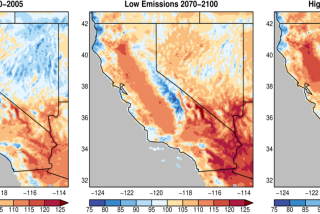Greed caused BP’s gulf oil spill, lawyers argue
- Share via
NEW ORLEANS — Energy giant BP, behind schedule and $50 million over budget drilling a deep-water well, emphasized cost-cutting over safety, causing the largest offshore oil spill in U.S. history, lawyers said Monday as the company’s high-stakes civil trial began.
Lawyers used PowerPoint presentations to provide a dramatic recounting of the April 20, 2010, explosion and fire in the Gulf of Mexico that killed 11 crew members. Workers were preparing to temporarily cap the Macondo well 4,100 feet underwater when it blew up. The 30-story drilling vessel about 50 miles offshore burned for two days before crumpling into the gulf.
The resulting spill of more than 4 million barrels of oil damaged the waters and economies of five states. And the responsible party was BP, according to the lawyers representing the federal government, Gulf Coast states and private parties.
The long-awaited trial, which is expected to last several months, could expose BP to about $17 billion in fines for violating the Clean Water Act. Federal District Judge Carl Barbier will decide whether BP’s actions were negligent or grossly negligent, which could force higher fines on the company.
BP has already pleaded guilty to criminal charges stemming from the disaster and will pay $4 billion to settle the case, the largest environmental penalty in U.S. history.
During opening statements Monday, BP’s actions were excoriated by a succession of lawyers who said that the London-based company’s corporate leaders encouraged a culture of “entrepreneurial risk-taking.”
“BP was blinded by greed,” said Luther Strange, Alabama’s attorney general. “To BP, money mattered most. Greed devastated the gulf.”
The first phase of the complex trial will examine the role of BP and the companies it contracted with to drill its Macondo well: Transocean, the owner of the Deepwater Horizon drilling rig; Halliburton, hired by BP to cement the well hole; and Cameron International, which manufactured the blowout preventer that failed to shut down the flow of oil during the emergency. Also included is M-I Swaco, the company that provided the material for the cement job.
Barbier’s wood-paneled courtroom was crowded with nearly 50 lawyers.
An 11th-hour attempt to settle the case apparently failed. The Justice Department reportedly offered a plea bargain that would require BP to pay a $16-billion penalty — $6 billion to settle the Clean Water Act violations, $9 billion for resource damage and $1 billion to fund unforeseen environmental issues, the New York Times and Wall Street Journal reported.
A settlement could be reached at any time. Lawyers for the Justice Department and BP declined to comment on settlement talks.
Michael Underhill, an attorney with the Justice Department, emphasized what he said was BP’s profit-driven culture. “The evidence will show that BP put profits above people, profits before safety and profits before the environment,” he said.
In the days before the blowout, the scene on the rig — which some workers dubbed the “well from hell” — became increasingly chaotic, said Jim Roy, a lawyer representing businesses and individuals hurt by the spill.
The captain of the vessel, a Transocean employee, had never been trained in operating the rig’s emergency systems, Roy said. The Deepwater Horizon’s emergency systems, with their required audible alarms, were disconnected out of concern that the klaxons would wake the crew, he said.
There was ample finger-pointing in court as each company sought to minimize its responsibility for the disaster. The other four defendants — Halliburton, Transocean, Cameron and M-I Swaco — argued that the final responsibility for the rig and its crew rested with BP.
A crucial well pressure test was misinterpreted by two BP employees, an error the company has previously acknowledged. Transocean’s drill crew “put too much trust in BP, and they paid for that fact with their lives,” said Transocean attorney Brad Brian.
Halliburton’s lawyer said key safety tests were omitted because they would have required time and money.
When BP’s turn came to make an opening statement, its attorney cast the well’s operation as a “team sport” and praised Transocean and Halliburton as the best in their fields.
“There is a lot of background noise about the engineering decisions made by BP,” lawyer Mike Brock said. “This was a multi-party, multi-causal event.”
After Barbier rules on the negligence issues and assesses each company’s portion of blame, the second part of the trial is expected to begin in late summer. That phase will attempt to determine more precisely how much oil was released. That difficult accounting will determine the size of the federal fine, which could be as little as $4.5 billion.
The company would be required to pay $1,100 for each spilled barrel under the Clean Water Act. But that fine would rise to $4,300 per barrel if BP were found to be grossly negligent.
Another determination of environmental damage must also be considered under a separate statute.
More to Read
Sign up for Essential California
The most important California stories and recommendations in your inbox every morning.
You may occasionally receive promotional content from the Los Angeles Times.










